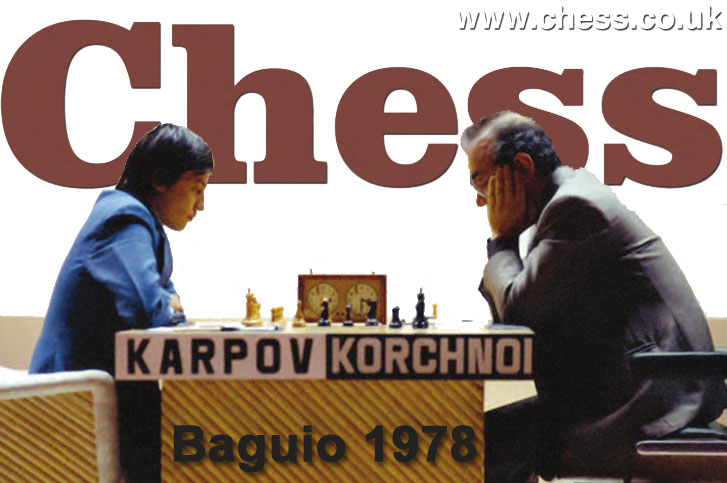


ChessBase 17 - Mega package - Edition 2024
It is the program of choice for anyone who loves the game and wants to know more about it. Start your personal success story with ChessBase and enjoy the game even more.
Ahead of the release of Closing Gambit, which tells the full story of the infamous 1978 Karpov-Korchoi match — which ended on October 17th, 1978 — we caught up with Alan Byron, the film’s producer.
Forty years ago, on July 18th 1978, Victor Korchnoi sat opposite his hated rival, world champion Anatoly Karpov, and slowly pushed his c-pawn forward by two squares. It was a quiet opening move to start the most controversial world championship match in chess history. Spassky versus Fischer in 1972 was simply the entrée for what became the staple diet of Soviet loyalist Anatoly Karpov defending the Motherland’s honour against defectors and dissidents in the guises of Korchnoi and Kasparov.
In 1978, a young, ambitious, Filipino chess organiser, Florencio Campomanes, obtained patronage from the despotic leader of the Philippines, Ferdinand Marcos, in order to stage the world chess championship in Baguio City. Over the following three months, the Battle of Baguio would rage on and off the chessboard as players, seconds, journalists, KGB officials and Eastern Mystics would descend on the bewildered locals.
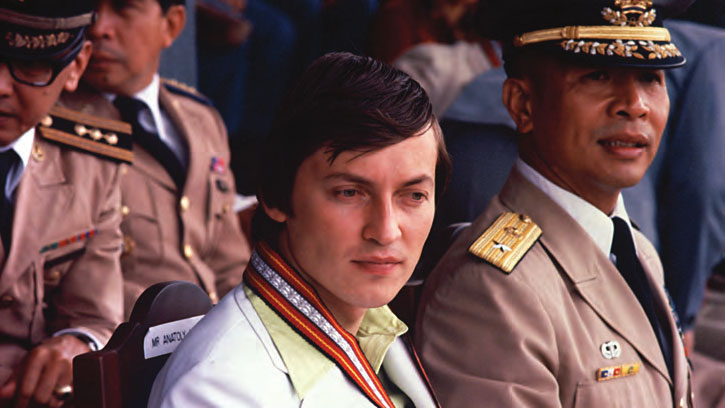
Anatoly Karpov, guest of honour of President Marcos and the Philippine military – AP Image
Powerplay 26: Checkmate Challenge — essential knowledge
Checkmate. That's the aim of the game. There are numerous ways to checkmate the enemy king, but there are common patterns that recur over and over again, and having these at our mental fingertips is essential for when we want to finish the game.
“If you were going to write a movie script, you couldn’t have done it better,” argues English GM Daniel King. Which is quite fortunate given that a new feature documentary — Closing Gambit — is being released to coincide with the fortieth anniversary of the 1978 championship and the start of the Carlsen versus Caruana match in November.
The film was successfully screened to international buyers at the Cannes Festival earlier this year and after the festival circuit, Hulu will screen Closing Gambit in the USA and Canada, followed by broadcasts in numerous European countries and China. It will be made available for digital platforms and DVD shortly after. Although chess is hardly a spectator sport, Closing Gambit’s director, Alan Byron, is pleased that chess will once again be back on TV screens.
“As an impressionable England junior back in the late 1970s, this match remains stuck in my memory, not just for the chess, but mainly for the political intrigue and one of the greatest sporting comebacks ever by an underdog. I pitched the idea for the film at Cannes in 2015 and as soon as I said the word ‘chess’ you could see the investors’ eyes starting to close. But once they listened to how the story played, the finance was literally on the table after two meetings. This is far more than a documentary about chess, it is about life and society stripped bare.”
Filming started in December 2016 with Vishy Anand, who lived in the Philippines for several years. Anand fought gruelling matches with Karpov in later years, but from the film, it is clear that Korchnoi made a great impression on him. “After all these years, many of the unkind things he said about me — to my face, because Victor would never say it behind your back — these are some of the fondest things I remember about him!”
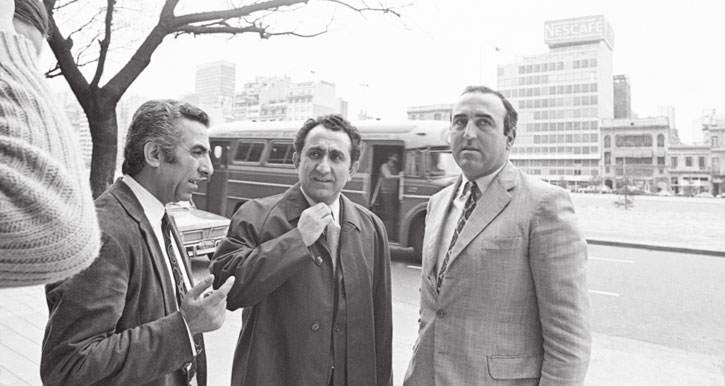
Ex-World Champion Tigran Petrosian (centre), who instigated the Soviet travel ban on Victor Korchnoi after the 1974 Candidates Final between Karpov and Korchnoi | Photo: AP
Indeed, the depth of Korchnoi’s contradictory character and its juxtaposition to Karpov’s coolness make for compulsive viewing. Whereas Korchnoi died just before filming started, Anatoly Karpov tells the story of the match and his relationship with Korchnoi with remarkable candour. “Korchnoi belonged to a small group of top chess players who believe it is better to hate the opponent. In this, Korchnoi was a clear follower of Botvinnik,” states Karpov. “With Korchnoi, we were on very good terms — we did mutual preparation in 1971 and 1972, but in 1974, he was complaining the officials were not on his side. But he did everything that officials should be on my side!”
The contributors to the documentary feature not only those who are able to tell the inside story of Baguio, but also the cream of chess over the last forty years. Before the intrigue of the 1978 match begins, the film sets the historical perspective that made chess occupy such a unique position with the Soviet Union.
“Chess has been viewed since Stalin’s time as a tool to prove the superiority of the communist system over the decadent, capitalist West,” states Garry Kasparov with characteristic vigour. Michael Stean, one of Korchnoi’s seconds in 1978 agrees: “That is why all the people who were in control in the Soviet Chess Federation were not chess players. They were simply people from the party and the KGB. The Soviets were not interested in chess per se — they simply wanted to win.”
How I became World Champion Vol.1 1973-1985
Garry Kasparov's rise to the top was meteoric and at his very first attempt he managed to become World Champion, the youngest of all time. In over six hours of video, he gives a first hand account of crucial events from recent chess history, you can improve your chess understanding and enjoy explanations and comments from a unique and outstanding personality on and off the chess board.
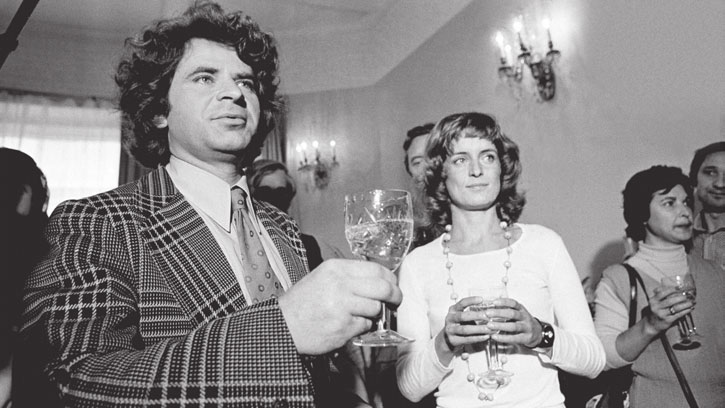
Boris Spassky was seen as a KGB informer by Korchnoi in 1977 following Spassky’s emigration to France after marrying a French citizen working in the embassy in Moscow | Photo: AP
After Spassky had embarrassed the Soviet Union by losing to Fischer, the Soviets had placed all their faith and resources in the young Anatoly Karpov to win the crown back. “The Russians really learned from their loss to Fischer,” declares former world champion, Vishy Anand. “They decided that they could no longer take prisoners. Losing to Korchnoi was not an option. The officials were more afraid of losing the 1978 championship than Karpov was. In 1978 Karpov took the practice of using seconds to a scientific level; and the KGB’s off-the-board political gamesmanship reached its zenith. To a young Indian boy like me at the time, I remember thinking, are these people adults? But I can tell you, when you are in that environment, it is deadly serious. You don’t want to concede a single thing to your opponent on and off-the-board.”
The mercurial Ray Keene, recalls his first visit to Korchnoi in 1974 in Moscow, when Korchnoi was playing his Candidates final match against Karpov. Keene showed Korchnoi an attacking idea against the Queen’s Indian which Korchnoi used later in the match to record a stunningly quick win against Karpov, and this assistance led Korchnoi to trust Keene to act as the leader of his seconds for the 1978 world championship cycle.
“Trust was not a word that existed in the Soviet Union,” states Michael Stean who became the analytical bedrock of Korchnoi’s team. “Because to trust someone in the Soviet system was dangerous, it gave you a weakness; and Victor was typical of everyone that lived through that system. He saw betrayals and intrigue all the time.” A fellow player from the Soviet Bloc, Vlastimil Hort was one of the few people that Victor and his wife Bella trusted. Bella confided to him that their apartment was being bugged in the mid-1970s, and Korchnoi spent several nights in Hort’s room during the 1975 Hastings chess tournament discussing how Victor could leave the Soviet Union the following year — and which Western country was the best to claim asylum in.
“One night we drank a whole bottle of whiskey whilst discussing this problem,” confides Hort in Closing Gambit. Given that Hort won the Hastings Premier that year, we can only assume that it was the night before the rest day! “I hated communists,” Hort says, “not the Russian people — only communists. When I had to leave Czechoslovakia to play chess, I had to ask the authorities for my passport, and when I returned I had to hand it back. Your passport was never your own under communism.”
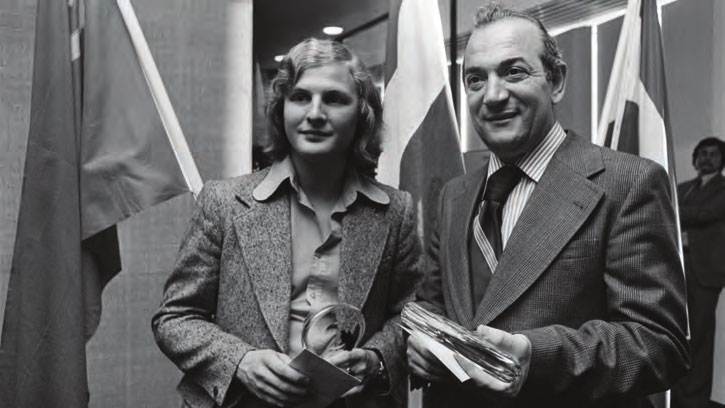
Victor Korchnoi asked Tony Miles how to spell ‘asylum’ at the 1976 IBM tournament in Amsterdam | Photo: AP
Korchnoi finally made the decision to defect in 1976 in order to be free to follow his love for chess. Genna Sosonko, the well-known chess author and GM, dramatically recalls the defection of Korchnoi at the Amsterdam IBM tournament and how Korchnoi felt his life was in danger from the KGB whilst in Holland. “He had to report to the Amsterdam police station every so often as an asylum seeker,” recalls Sosonko. “He used to be driven, lying in the back seat of the car with blankets over him until the last seconds before running into the police station.” Yasser Seirawan, who became Korchnoi’s second in the 1981 world championship against Karpov, agrees that a KGB-orchestrated strike was a real possibility: “Victor had no doubts whatsoever that he would be assassinated. If the KGB couldn’t beat him over the chessboard, the better to kill him.”
The Korchnoi Gambit against the French
The French Defence is one of Black's most popular and uncompromising responses to 1.e4, and it's important to have a viable weapon prepared. In this presentation, IM Sam Collins explains the Korchnoi Gambit, which is characterised by White placing his king's knight on f3 in the Tarrasch variation.
In an incredible example of real life being stranger than fiction, Korchnoi’s route to the 1978 world championship saw him pitted against Soviet players in the quarter-final, the semi-final and in the final itself against Spassky. Having won through to play Karpov, who was a personal favourite of Soviet leader, Leonid Brezhnev, not even Korchnoi realised that the full force of the KGB was going to wage war against him. Before the match had even begun, there were political wrangles over which flag Korchnoi would play under.
The Soviet delegation under Baturinsky, who used to sign death warrants in the Soviet Union as a Colonel in the KGB, refused to allow Korchnoi to play under his adopted Swiss flag. Baturinsky offered a white flag in its place, as that symbolised cowardice. Never one to gracefully back down, Korchnoi said, in that case, he would be happy to play under the Soviet Union’s hammer and sickle flag, but only if the words ‘I escaped’ were written underneath.
The Battle of Baguio was the high point of Victor’s chess career according to Kasparov, even though “The KGB used every dirty chess trick in the book.” If chess enthusiasts believe that not shaking hands began with Topalov and Kramnik, they will need to go back to the first win in the 1978 championship where Karpov refused to shake Korchnoi’s extended hand before the start of Game 8. “Korchnoi was insulted by this tactic,” says Ray Keene. “The red mist came down and he went down horribly in probably his worst game of the match.”
After Karpov won the first game of the match after seven draws, the supposedly ‘impartial’ match organiser, Florencio Campomanes threw a champagne reception to celebrate. In a rare video, Campomanes is seen raising his champagne glass to Karpov and his KGB entourage and toasting his first victory. “And here’s to five more wins,” gloats the match organiser who was soon to run for the FIDE presidency, knowing that he needed the Soviet bloc’s votes.
No article can do full justice to the twists and turns of this incredible match which saw drunken KGB chauffeurs crashing Karpov’s official car at night, orange-robed mystics levitating for a Korchnoi victory while on police bail for the attempted murder of an ambassador, Filipino policemen outwitting Keene and Stean’s adjournment analysis, and a key rook and pawn ending adjournment that Korchnoi won, but then spent the next twenty years analysing without coming to a conclusion as to whether it was won or drawn.
When Korchnoi lost four more games and fell behind in the match by five wins to two, everything appeared to be over, but then Korchnoi staged a remarkable comeback. Just before what turned out be the crucial last game of the World Championship, Game 32, Ray Keene reveals for the first time what actually happened behind the scenes as the KGB broke all the protocols they had previously agreed and put pressure on Campomanes to make life as difficult as possible for Korchnoi and his team.
Out of respect for a former FIDE president, Keene has previously not revealed the private conversation he had whilst Karpov was taking a time-out at the world championship basketball match in Manila (which the mighty Soviets embarrassingly lost in the last seconds to Yugoslavia). A behind-closed-doors conversation and offer made to Keene as the head of Korchnoi’s delegation was, he believes, a misguided attempt at diplomacy. Ray Keene is the only living person that bears witness to what happened that night, but events in a subsequent FIDE world championship match look to bear him out. [This alludes to Keene's claim, actually first made in Chess Life, September 1985, that Max Euwe offered to abort the match at 5-5 and arrange a rematch the following year. Euwe died in 1981 so he would not have been in a position to rebut Keene's account. -Ed.]
Nigel Short takes us on an electrifying journey through a very rich chess career, which saw him beat no less than twelve world champions. His experience in tournaments and matches all over the world – Short has visited a total of 89 countries – can be seen in the narratives that precede the games which he annotates with humour and instructive insights.
“I remember Nigel Short being amazed and asking why Ray hadn’t mentioned this before when I related it to him in Gibraltar,” reveals Closing Gambit director Alan Byron. “But whilst Max Euwe was alive, Ray didn’t think it correct to discuss it, and then it just became a less important footnote in history as time went on.” The subterfuge that emerged on that fateful night led Keene to believe that that the KGB’s activities off-the-board meant that Korchnoi was going to win on the chess board. However, in a concise summary of Game 32 and the end of the match, Keene simply states, “And then it all turned to rat shit!”
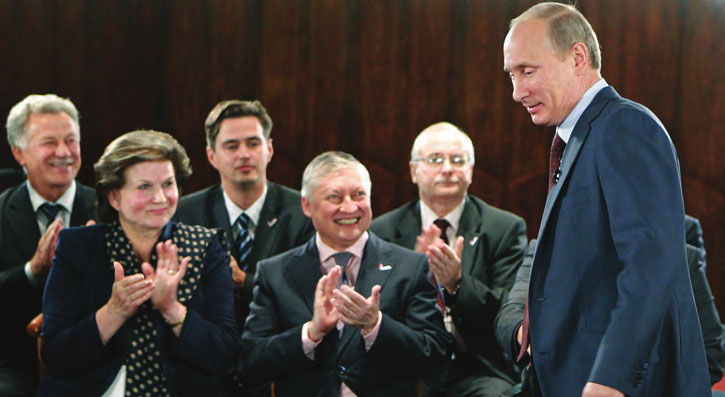
Anatoly Karpov currently represents a ‘constituency’ in Putin’s Russia that is larger than France and rich in minerals | Photo: AP
Master Class Vol.6: Anatoly Karpov
On this DVD a team of experts looks closely at the secrets of Karpov's games. In more than 7 hours of video, the authors examine four essential aspects of Karpov's superb play.
Forty years after the Battle of Baguio, Closing Gambit is able to not only recount the events that drew the whole world’s press to a chess event, but also place the event in perspective. “It will be a very, very long time before a world chess championship will have any geopolitical significance”, says a wistful Vishy Anand. “Now what we have is just kids playing a fun game of chess.” Emil Sutovsky’s overview is that the passage of time has made the match less emotional. “Korchnoi wasn’t a freedom-fighting angel and Karpov wasn’t a monstrous KGB villain. They both had shades of black and white.”
For Michael Stean though, the events in Baguio were life-changing in his understanding of the world and the value of freedom. “Victor’s legacy is that he fought against a system that demanded conformity and obedience. That system isn’t there anymore, but his legacy should not be forgotten.” Kasparov, a well-known opponent of the Soviet system himself, shares the same sentiment. “Victor fought alone against a monstrous system. He lost the match — but he showed the vulnerability of the system. He made it possible for others to follow in his footsteps and take up the fight.”
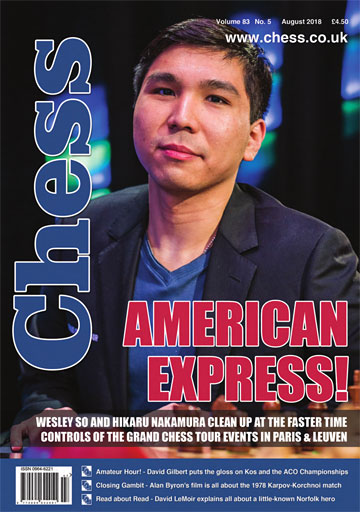
The above feature is reproduced from Chess Magazine August/2018, with kind permission.
CHESS Magazine was established in 1935 by B.H. Wood who ran it for over fifty years. It is published each month by the London Chess Centre and is edited by IM Richard Palliser and Matt Read.
The Executive Editor is Malcolm Pein, who organises the London Chess Classic.
CHESS is mailed to subscribers in over 50 countries. You can subscribe from Europe and Asia at a specially discounted rate for first timers, or subscribe from North America.
UK’s most popular CHESS Magazine — established 1935! All the regular features of the UK’s best-selling CHESS magazine plus more!

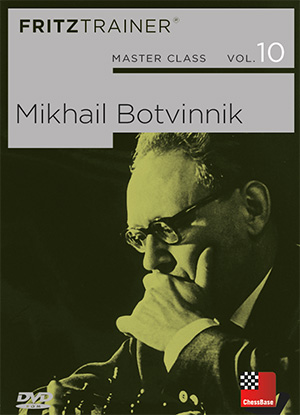 Master Class Volume 10 – Mikhail Botvinnik
Master Class Volume 10 – Mikhail Botvinnik
ChessBase PC-DVD,
running time: 8 hours, 17 minutes
RRP £26.99 SUBSCRIBERS £24.29
Once again acclaimed presenters and experts Mihail Marin, Oliver Reeh and Karsten Müller have teamed up to tackle one of the all-time greats for ChessBase. On this occasion they are joined by the ever professional Yannick Pelletier. Botvinnik’s games remain as instructive as ever and viewers will quickly learn how he chose his openings in accordance with the upcoming middlegame structure and battle. Botvinnik produced many strategic masterpieces, but he could also attack with aplomb on occasion, as becomes clear here, and his endgame prowess also comes under the microscope.
Order online from
The London Chess Centre or Chess4Less (USA)
 Meeting the Gambits Vol.2 – Gambits after 1.d4
Meeting the Gambits Vol.2 – Gambits after 1.d4
Andrew Martin, PC-DVD,
running time: 5 hours, 49 minutes
RRP £26.95 SUBSCRIBERS £24.25
Andrew Martin has also been busy for ChessBase and here explains how the 1 d4 and 2 c4 player should successfully navigate their way when faced with the various gambits playable against them. Unsurprisingly the Benko, Budapest and Albin fill up a fair amount of coverage, but Martin also looks at gambits like the Hennig-Schara, 1 d4 d5 2 c4 e6 3 Nc3 c5 4 cxd5 cxd4.
Order online from
The London Chess Centre or Chess4Less (USA)
You can also find these products in the ChessBase Shop